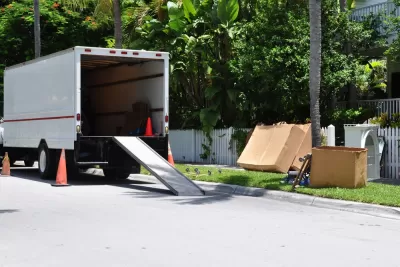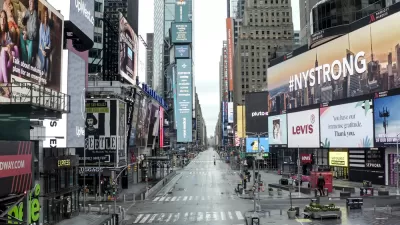New numbers from the Census Bureau show that fewer Americans moved in 2020 than ever before, belying dire predictions about the death of cities and the hollowing out of urban neighborhoods.

Despite the hype over a perceived 'urban exodus' due to COVID-19, Americans actually moved less in 2020, according to the Pew Research Center and data from the U.S. Census Bureau’s Current Population Survey. Richard Fry and D'Vera Cohn report that with only 8 percent of Americans making a move between March 2020 and March 2021, this is the lowest rate since the government started keeping records in 1948.
According to the article, "More people moved out of U.S. cities than moved into them," and "more people moved out of rural areas than moved into them in 2020." The only cities that experienced increased out-migration from previous years were New York and San Francisco. And while "suburbs had more people moving in from other U.S. communities than out," fewer Americans moved into suburban areas in 2020 than in prior years. The survey also indicates that people between 18 and 29 were most likely to move and that many pandemic moves were temporary.
The authors note that these numbers only reflect domestic migration and do not account for people moving in from abroad, or births and deaths. But the data runs counter to the popular narrative that Americans fled cities for lower-density communities in larger numbers during the pandemic.
FULL STORY: In 2020, fewer Americans moved, exodus from cities slowed

Maui's Vacation Rental Debate Turns Ugly
Verbal attacks, misinformation campaigns and fistfights plague a high-stakes debate to convert thousands of vacation rentals into long-term housing.

Planetizen Federal Action Tracker
A weekly monitor of how Trump’s orders and actions are impacting planners and planning in America.

In Urban Planning, AI Prompting Could be the New Design Thinking
Creativity has long been key to great urban design. What if we see AI as our new creative partner?

Cal Fire Chatbot Fails to Answer Basic Questions
An AI chatbot designed to provide information about wildfires can’t answer questions about evacuation orders, among other problems.

What Happens if Trump Kills Section 8?
The Trump admin aims to slash federal rental aid by nearly half and shift distribution to states. Experts warn this could spike homelessness and destabilize communities nationwide.

Sean Duffy Targets Rainbow Crosswalks in Road Safety Efforts
Despite evidence that colorful crosswalks actually improve intersection safety — and the lack of almost any crosswalks at all on the nation’s most dangerous arterial roads — U.S. Transportation Secretary Duffy is calling on states to remove them.
Urban Design for Planners 1: Software Tools
This six-course series explores essential urban design concepts using open source software and equips planners with the tools they need to participate fully in the urban design process.
Planning for Universal Design
Learn the tools for implementing Universal Design in planning regulations.
Appalachian Highlands Housing Partners
Gallatin County Department of Planning & Community Development
Heyer Gruel & Associates PA
Mpact (founded as Rail~Volution)
City of Camden Redevelopment Agency
City of Astoria
City of Portland
City of Laramie




























